Rep. Kim Withdrew Funds Even as Firm Foundered : Finances: Candidate continued to receive full salary and rent payments. He says he was entitled to the money.
On the campaign trail last year, Rep. Jay C. Kim (R-Diamond Bar) presented himself as the epitome of the American dream, a self-made businessman who built a prosperous engineering firm and wanted to privatize government services.
But his company was far from thriving. While Kim was campaigning, the federal government had a $165,000 lien on JayKim Engineers Inc. for unpaid taxes, and the state was trying to collect back taxes, too.
To meet its payroll, the company dipped into its employee profit-sharing plan for short-term loans totaling $173,000 since May, 1992--transactions that the firm’s former chief financial officer acknowledges were prohibited by tax and labor laws.
After the election, the firm defaulted on a $1-million loan. An Orange County judge froze the company’s bank accounts last month and appointed a receiver to safeguard the company’s assets.
Kim, the first Korean-American member of Congress, said in an interview that the company has struggled to pay its bills. But he said he did not neglect the company during the campaign and did not authorize anyone to borrow money from the profit-sharing plan.
He said JayKim Engineers, like many other firms in Southern California, has fallen on tough times during the last year because of the recession. “Many nights I couldn’t sleep thinking about (making the) payroll,” he said.
Even as the corporation was laying off employees, letting bills go unpaid and slipping toward insolvency during the last year, Kim withdrew hundreds of thousands of dollars from the company for personal use and campaign expenses, The Times has found.
He paid himself thousands of dollars in dividends and continued to collect his $186,300 annual salary while running for the House of Representatives.
During the last year, Kim and his wife also received about $100,000 from the corporation for office space in San Diego that the firm rents from the Kims but does not use. Tagged onto the rent invoices were bills ranging from car polishing to a $60,000 lifetime country club membership for Kim.
In addition, documents show that the freshman congressman used funds from his firm to pay thousands of dollars in campaign and political expenses, including staff, mailings, printing and travel.
The payments to Kim and his campaign during his company’s financial troubles raise legal and ethical issues. Federal election law bars corporations from contributing money or services to candidates for federal office. And state law prohibits owners of corporations from withdrawing funds for their own benefit if the withdrawals are leading the firm into insolvency.
Kim said all of his compensation from the corporation was proper and that rent payments from JayKim Engineers were made under a valid lease.
He acknowledged that using corporate funds for his campaign would be illegal but said he always intended to repay the company and will do so.
Kim--a Republican who represents portions of Los Angeles, Orange and San Bernardino counties--is a former Diamond Bar City Council member and mayor. His engineering company, which he founded 15 years ago, specializes in government contracting work. At one point, JayKim employed 170 people in five offices and was among the top 500 engineering companies in the nation.
After he was elected to the new 41st Congressional District seat last year, Kim promised to sell the company to avoid even the appearance of a conflict of interest when the firm bids on government contracts.
The congressman said he sold most of his interest in JayKim in April to real estate entrepreneur Sung Woo Min and the rest in May--with no money down.
But Kim remains active in the corporation’s planning and attends meetings. He owns the building where JayKim Engineers is headquartered. Moreover, he is personally liable for a $1-million bank loan the company defaulted on in May.
After the default on May 2, Sunwest Bank expressed skepticism that Kim had sold the company and asked an Orange County Superior Court judge to appoint a receiver.
The bank alleged that JayKim Engineers repeatedly had incurred overdrafts and engaged in several “questionable transactions,” including $140,000 in loans to Kim and use of funds from the profit-sharing plan. The bank argued that the firm’s assets were “in imminent danger of being misappropriated, dissipated and irreparably lost.”
The judge named a receiver and prohibited the corporation from making “any payments to defendant Jay Kim for any purpose.”
The new owner, Min, has blamed much of the company’s financial trouble on Kim’s absence during the campaign and is reviewing the company’s books to determine if he should send a bill to Kim for campaign costs.
“Clearly, any financial drain that the company has experienced during the last year was occasioned while Mr. Kim was campaigning,” Min said in a sworn court declaration last month. “ . . . With no one responsible for the day-to-day, hands-on operation of the company, the productivity suffered, sales suffered, the employees slacked off, and operations and incentives became generally sloppy.”
Kim said he reduced his workweek from 60 hours to 40 hours but did not neglect his business during the campaign, which ran from February, 1992, through the Nov. 4 election. He said he worked mornings and weekends on company business.
His JayKim salary for 1992, according to his federal financial disclosure statements, was $186,300--up from $160,000 the year before.
In addition, records show that Kim has charged $12,500 in miscellaneous personal expenses to the corporation since his election. These charges ranged from a $100 Christmas tree for his home to thousands of dollars in car lease payments and credit card bills.
Kim said he has not paid the $12,500 back to the company because he has not been given an itemized bill. “If I got a bill, and I didn’t pay it, then, my God, I should be crucified,” he said in an interview. “But I never got it. Somehow you got it. I’m very disappointed with what’s happening here.”
The $12,500 was billed to an account that already had footed the bill for $127,000 in Kim’s personal expenses during previous years. State tax authorities are auditing the account, according to a May 4 letter sent to the company.
Kim disputed the $127,000 figure, saying: “It must be a bookkeeping error.”
Financial statements show that JayKim Engineers has had virtually no cash on hand since at least September, 1992, and has suffered monthly losses since last November. The losses are projected to continue through August, even though the company has closed offices and reduced its staff to 70.
“The company never had any cash in the bank,” said Fred Schultz, the corporation’s former chief financial officer, who left the company this spring. “It was always broke for cash.”
A “burning need” for money to meet payroll obligations, he said, prompted him to withdraw about $300,000 over a three-year period from the company’s profit-sharing plan set up for employees. Records show that $173,000 of the money was withdrawn after May, 1992. All the money has been repaid with interest.
In a confidential Feb. 4 memorandum obtained by The Times, Schultz said that the money was borrowed at Kim’s direction. “As you are aware, withdrawing plan funds to be used by the company is in violation of IRS and Department of Labor laws,” he wrote company President Roland Miller, urging an end to the practice. “They are known as prohibited transactions.”
Gerald Birnbaum, special investigator with the U.S. Department of Labor’s pension and welfare administration, said profit-sharing plans are not supposed to be touched by corporations. He said the agency generally seeks civil penalties in cases where the funds have been paid back with interest and seeks criminal charges when the funds have not been repaid.
Kim, who was a trustee of the plan, said he was aware of the withdrawals but did not initiate them. He said Schultz, also a trustee, was to blame for not properly policing the fund.
“I’d rather file for bankruptcy” than borrow from the profit-sharing plan, Kim said.
Schultz could not be reached for comment on Kim’s statement.
Cash flow problems also prevented the corporation from paying a 1991 federal tax bill until August, 1992, when it amounted to $165,055 with penalties.
A state tax bill for 1991 was not paid until a few months ago, after the state Franchise Tax Board served the company with a final notice threatening to suspend the company’s right to conduct business in California.
Earlier this year, the company turned to one of Kim’s campaign strategists to arrange short-term loans to help meet the payroll. In February, Steven and Janice Nieh of Rowland Heights loaned JayKim Engineers $10,000, documents show.
The court-appointed receiver has been directed to determine if the firm is solvent.
The company’s most current balance sheet, for the month of May, shows corporate assets worth $3.1 million, including $2.3 million in payments due the company. But creditors are concerned that nearly half are more than 90 days past due.
In addition, Schultz said, $768,000 billed to the city of Moreno Valley may not be collected because a judge has ruled that JayKim Engineers has no right to the money. That would lift the corporation’s liabilities higher than its assets.
Financial analysts and bankruptcy experts said a company becomes insolvent under state law when its liabilities exceed its assets--or when bills are not paid as they come due.
All transactions by an insolvent corporation should be closely examined “to be sure creditors aren’t being improperly harmed,” said John Hirshleifer, vice president of FinEcon, which analyzes business transactions for litigants.
The law, Hirshleifer said, prohibits withdrawals of funds when “little or nothing . . . of value is being received in return by the corporation.”
He declined to comment on Kim’s business but said that as a rule, transactions in which the corporation pays money to a company or business closely affiliated with the owners or employees are considered “suspicious.”
During the last year, JayKim Engineers paid about $130,000 in rent and other expenses for use of property owned by the Kims in San Diego--six office condominiums on Balboa Avenue and one residential condominium on State Street. Last week, The Times found all the units unoccupied--and a for-lease sign outside one building.
Kim said he personally could not afford to lose rent on the buildings, so he had the firm continue to pay under terms of his lease. He said the corporation once occupied the Balboa Avenue building but moved out more than a year ago. Occasionally the corporation uses the State Street condo for company business, he said, because it is cheaper than paying hotel bills.
Invoices show that in addition to the monthly rent of $5,700, the corporation has been billed for the Kims’ miscellaneous expenses. These range from hundreds of dollars spent repairing and buffing their Mercedes Benzes to monthly installments on a $60,000 lifetime membership at the Mission Hills Country Club in Rancho Mirage.
Kim said he got a “brilliant idea” that joining the country club was a good way to meet and entertain prospective clients. But he said that, given the company’s current financial problems, he would not join today. “I don’t have that kind of money,” he said.
In June, JayKim Engineers was presented with two rent bills--one for the Kims’ unused San Diego property, the other for property about five miles away on Frazee Road that the corporation uses as a satellite office.
The owner of the Frazee Road property asked the corporation to pay $22,000 in back rent or leave. JayKim Engineers paid $6,000 and promised the rest later.
The Kims presented the engineering firm with invoices for three months back rent totaling about $18,000--and were paid in full.
Rent Payments
Jay Kim’s financially troubled corporation rented office condos owned by Kim and his wife in San Diego. JayKim Engineers Inc. paid more than $100,000 in rent and other expenses for this space but the corporation did not use the offices, which have been vacant for more than a year. Below is a check for $21,702, covering two months back rent and including property taxes, janitorial services and $4,656 in payments toward a $60,000 life membership for Kim in the Mission Hills Country Club. The money was paid to J & J Properties, a management company operated by Kim’s wife, June.
More to Read
Get the L.A. Times Politics newsletter
Deeply reported insights into legislation, politics and policy from Sacramento, Washington and beyond. In your inbox three times per week.
You may occasionally receive promotional content from the Los Angeles Times.










